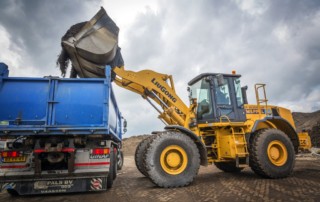Kill export subsidies. Kill the Ex-Im Bank.
Imagine the Chinese government decides to help the people of Kenya. To do this the Chinese government buys 5,000 wheeled loaders and excavators from Liugong Machinery and gives them for free to the Kenyan government, Kenyan construction firms, and groups of Kenyan citizens who want to build roads and stuff.
(Real world export subsidies are much smaller, of course, but the principle is the same. Foreign customers of a domestic exporter get taxpayer-subsidized discounts, not totally free stuff.)
Who wins? Kenyan customers and Liugong’s owners and employees, who now have a huge increase in demand for their product.
Who loses? Chinese taxpayers, who must foot the bill, and the owners and employees of Liugong’s Chinese and foreign competitors, who don’t have this generous taxpayer-subsidized benefit and can’t possibly compete with free.
Now let’s journey to America to meet an (imaginary) executive from Caterpillar, an American firm competing with Liugong to sell wheeled loaders and excavators to Kenyans. Caterpillar can’t give their product away, they need to sell it. This executive goes to a U.S. policymaker and asks for a similar export subsidy to what Liugong received from the Chinese government.
Imaginary Caterpillar executive: “Caterpillar is losing business in Kenya to our Chinese competitor Liugong. The Chinese government buys equipment from Liugong and gives it to Kenya. The U.S. government needs to do the same for us. If they don’t we’ll completely lose the Kenyan market to the Chinese. American taxpayers need to put up money to buy Caterpillar wheeled loaders and excavators and then give that machinery to Kenyans. If you don’t, we’ll lose that export business and American jobs.”
American policymaker: “Let me get this straight. We should take money from American taxpayers, use it to buy equipment from your company, and then give that equipment to the Kenyans, all because the Chinese are doing the same thing with your competitor?”
Cat exec: “I agree it sounds silly, but if you don’t do this we’ll lose American jobs. It would be better if neither China nor the U.S. did this, but as long as the Chinese do, you have to as well. Unless you want to put America at a competitive disadvantage and lose the Kenyan heavy equipment market…”
American policymaker: “There’s a difference between what’s good for America and what’s good for one firm in America. China’s policy puts one American company (yours) at a tremendous disadvantage in winning business in one foreign market. I feel bad about that, but I’m not sure the solution you propose makes things […]
